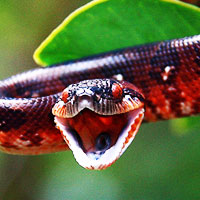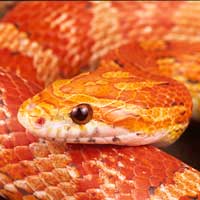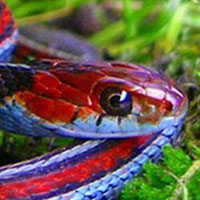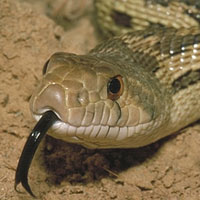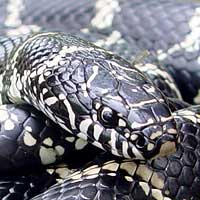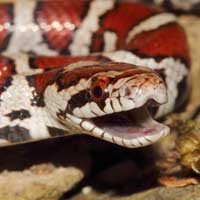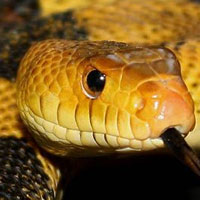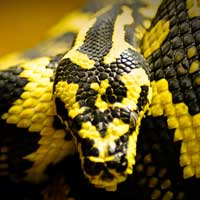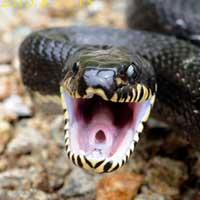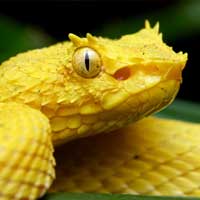Everything You Need to Know About the Black Rat Snake
The Black Rat Snake, scientifically known as Pantherophis obsoletus, belongs to the Colubridae family, which is the largest family of snakes, encompassing a diverse range of non-venomous and mildly venomous species known for their adaptability and widespread habitats.
Scientific Name: Pantherophis obsoletus
Snake Family: Colubridae
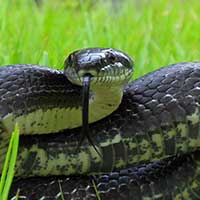
Introduction to the Black Rat Snake
The Black Rat Snake (*Pantherophis obsoletus*) is a large, non-venomous snake native to North America. Known for its glossy black scales and docile nature, this species is popular among snake enthusiasts. With proper care and habitat, the Black Rat Snake thrives in captivity and serves as a great pet for both novice and experienced keepers.
Creating the Ideal Habitat for the Black Rat Snake
To ensure the Black Rat Snake's well-being, replicating its natural habitat is essential. These snakes are found in forests, grasslands, and rocky areas. Key habitat requirements include:
- Enclosure Size: Provide a minimum of a 40-gallon tank for adults with secure locking mechanisms.
- Temperature Gradient: Maintain daytime temperatures of 75-85°F with a basking spot at 90°F and nighttime temperatures between 65-75°F.
- Humidity: Keep humidity levels at 40-60%, with occasional misting to support shedding.
- Substrate: Use aspen shavings, coconut fiber, or cypress mulch to mimic their natural ground cover.
- Enrichment: Add climbing branches, hides, and rocks to encourage exploration and natural behaviors.
Refer to the table below for quick habitat guidelines:
| Habitat Element | Recommended Specifications |
|---|---|
| Enclosure Size | 40+ gallons |
| Temperature | 75-85°F (day), 65-75°F (night) |
| Humidity | 40-60% |
| Substrate | Aspen shavings, coconut fiber, cypress mulch |
Diet and Feeding Guidelines for the Black Rat Snake
The Black Rat Snake is a carnivorous species that thrives on a diet of rodents. Follow these feeding guidelines:
- Juveniles: Feed pinky mice every 5-7 days.
- Subadults: Offer small to medium mice every 7-10 days.
- Adults: Feed adult mice or small rats every 10-14 days.
- Prey Preparation: Use pre-killed prey to prevent injuries during feeding.
- Hydration: Always provide a shallow dish of fresh water for drinking and soaking.
A consistent feeding schedule supports the snake's growth and health.
Behavior and Temperament of the Black Rat Snake
The Black Rat Snake is renowned for its calm and inquisitive nature, making it an excellent pet. Here are some of its behavioral traits:
- Climbing Enthusiasts: These snakes are adept climbers and enjoy vertical spaces within their enclosure.
- Diurnal Activity: They are active during the day and may explore their surroundings.
- Docile Temperament: With regular handling, they become accustomed to human interaction.
- Defensive Behavior: When threatened, they may vibrate their tail or emit a musk, but bites are rare.
Understanding their behavior helps create a positive experience for both the owner and the snake.
Health and Lifespan of the Black Rat Snake
With proper care, Black Rat Snakes can live up to 20 years in captivity. Key factors for maintaining their health include:
- Common Health Issues: Look out for respiratory infections, mites, and improper shedding.
- Preventative Measures: Maintain consistent temperature and humidity levels and clean the enclosure regularly.
- Veterinary Care: Schedule regular check-ups with an exotic animal veterinarian.
Regular observation and proper husbandry are essential to keeping your Black Rat Snake healthy and active.
Reproduction and Breeding of the Black Rat Snake
Breeding Black Rat Snakes in captivity is achievable with the right preparation. Important aspects include:
- Breeding Season: Typically occurs in spring following a winter brumation period.
- Clutch Size: Females lay 6-12 eggs per clutch.
- Incubation: Eggs should be incubated at 80-85°F for 50-60 days.
- Hatchlings: Provide appropriate-sized enclosures and prey for juveniles once hatched.
Successful breeding requires careful attention to environmental conditions and health monitoring.
Handling and Care Tips for the Black Rat Snake
Proper handling and care are crucial to the well-being of your Black Rat Snake. Follow these tips:
- Handle your snake gently and support its entire body.
- Avoid handling immediately after feeding to prevent regurgitation.
- Provide a clean and secure enclosure to minimize stress and health risks.
- Include enrichment items like climbing branches and hides to promote natural behaviors.
- Monitor the snake's behavior and physical condition for signs of stress or illness.
Building trust through proper handling ensures a rewarding experience for both you and your pet snake.
Other Snakes In This Species
 Aesculapian Rat Snake
Aesculapian Rat Snake Amur Russian Rat Snake
Amur Russian Rat Snake Bairds Rat Snake
Bairds Rat Snake Black Rat Snake
Black Rat Snake Chinese Twin-spotted Rat Snake
Chinese Twin-spotted Rat Snake Diadem Rat Snake
Diadem Rat Snake Diones Rat Snake
Diones Rat Snake Eastern Fox Snake
Eastern Fox Snake Everglades Rat Snake
Everglades Rat Snake Four-lined Rat Snake
Four-lined Rat Snake Gray Rat Snake
Gray Rat Snake Great Plains Rat Snake
Great Plains Rat Snake Green Rat Snake
Green Rat Snake Ladder Rat Snake
Ladder Rat Snake Leopard Rat Snake
Leopard Rat Snake Mandarin Rat Snake
Mandarin Rat Snake Radiated Rat Snake
Radiated Rat Snake Steppes Rat Snake
Steppes Rat Snake Texas Rat Snake
Texas Rat Snake Trans-Pecos Rat Snake
Trans-Pecos Rat Snake Trinket Rat Snake
Trinket Rat Snake Yellow Rat Snake
Yellow Rat Snake
